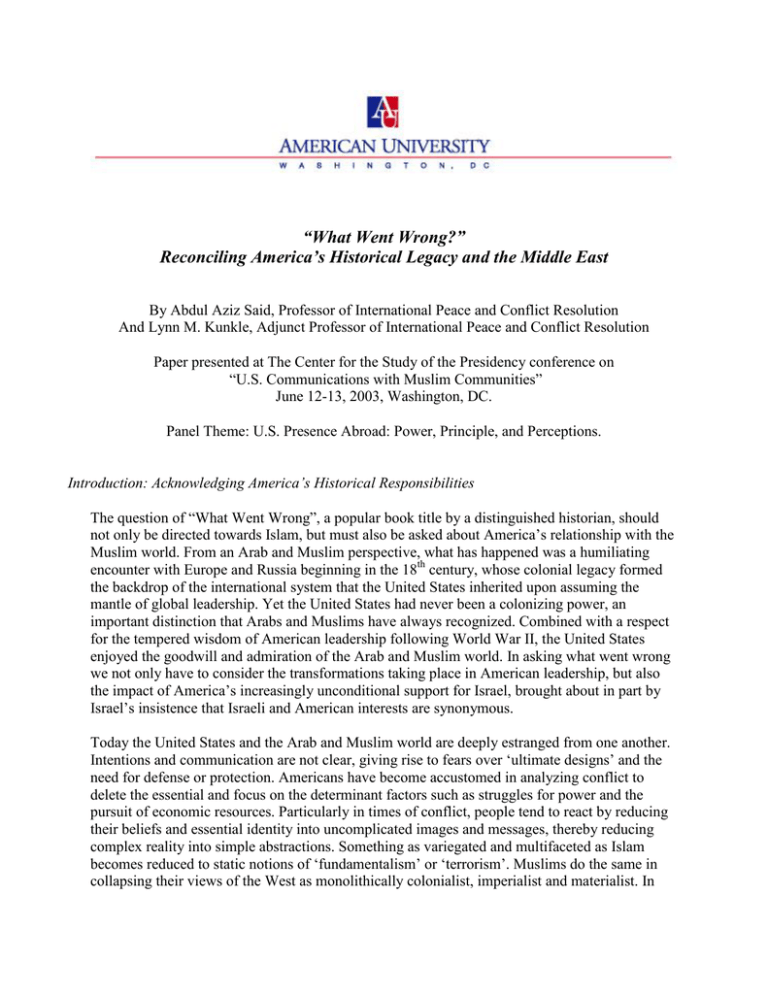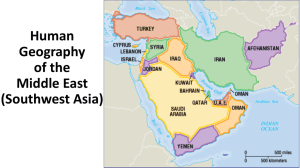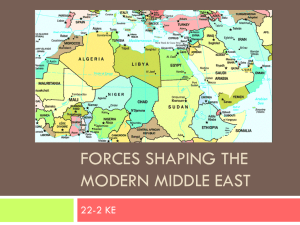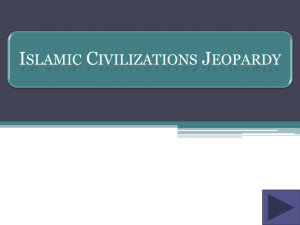“What Went Wrong?” Reconciling America’s Historical Legacy and the Middle East
advertisement

“What Went Wrong?” Reconciling America’s Historical Legacy and the Middle East By Abdul Aziz Said, Professor of International Peace and Conflict Resolution And Lynn M. Kunkle, Adjunct Professor of International Peace and Conflict Resolution Paper presented at The Center for the Study of the Presidency conference on “U.S. Communications with Muslim Communities” June 12-13, 2003, Washington, DC. Panel Theme: U.S. Presence Abroad: Power, Principle, and Perceptions. Introduction: Acknowledging America’s Historical Responsibilities The question of “What Went Wrong”, a popular book title by a distinguished historian, should not only be directed towards Islam, but must also be asked about America’s relationship with the Muslim world. From an Arab and Muslim perspective, what has happened was a humiliating encounter with Europe and Russia beginning in the 18th century, whose colonial legacy formed the backdrop of the international system that the United States inherited upon assuming the mantle of global leadership. Yet the United States had never been a colonizing power, an important distinction that Arabs and Muslims have always recognized. Combined with a respect for the tempered wisdom of American leadership following World War II, the United States enjoyed the goodwill and admiration of the Arab and Muslim world. In asking what went wrong we not only have to consider the transformations taking place in American leadership, but also the impact of America’s increasingly unconditional support for Israel, brought about in part by Israel’s insistence that Israeli and American interests are synonymous. Today the United States and the Arab and Muslim world are deeply estranged from one another. Intentions and communication are not clear, giving rise to fears over ‘ultimate designs’ and the need for defense or protection. Americans have become accustomed in analyzing conflict to delete the essential and focus on the determinant factors such as struggles for power and the pursuit of economic resources. Particularly in times of conflict, people tend to react by reducing their beliefs and essential identity into uncomplicated images and messages, thereby reducing complex reality into simple abstractions. Something as variegated and multifaceted as Islam becomes reduced to static notions of ‘fundamentalism’ or ‘terrorism’. Muslims do the same in collapsing their views of the West as monolithically colonialist, imperialist and materialist. In both cases these responses are self-serving and self-aggrandizing, yet in no way historically accurate or representative of either cultural values or beliefs. Explanation and scholarship on Islam has so far not contributed to a better understanding between the West and Islam. Neither has the empty ideological debate on ‘Orientalism’ or the static understandings of Clashes of Civilizations or Max Weber’s long-lived theories of Protestant culture and capitalism. These have only captured a retrospective vision of relationships. Instead, we need to develop a shared prospective vision that is grounded in the realities of historical relationship. It is an interesting function of power to ignore context and delete or revise history to suit the exigencies of the present. Yet the historical context forms an integral and inescapable component of America’s relationship with the Middle East. Given the importance of historical collective memory in Arab cultural and religious identity, American efforts to reestablish goodwill in the region must consciously reconcile its historical legacy with leadership and in relationship today. The Need for Vision in American Leadership Although most of the world looks upon the American standard of living as a goal toward which to aspire, the Middle East and the global community today is failing to find in the United States a natural leader in world politics. In a military sense, the United States remains predominant. The U.S is not suffering in stature. But its claim to leadership has lost its purpose. Concerned Americans increasingly find themselves without an established framework to judge the wisdom (or lack thereof) of United States actions in world politics, while the American foreign policy establishment finds itself without a reliable compass to guide its conduct of foreign policy. The Bush administration has fallen into a Realist trap: by aggressively believing that it has sufficient military and material carrots, and with enough implicit or overt sticks, to force its agenda on the world, it has forgotten that the compelling force of American power has always been its universal morality. America today suffers from an absence of vision. In a climate where there is no vision, pandering replaces leadership, mood replaces action, and charisma replaces leadership. Without a consensus on shared goals or aspirations, coercion replaces assent. Leadership that does not inspire the highest values and trust of others ultimately will not last. If the Bush administration can only offer the world a traditional Realist perspective wherein great power is deployed to resolutely and remorselessly for its own interests and to preserve its own hegemony and access to resources, it can inspire only resistance. Disconnected American Ideals and Values in the Middle East America’s historical legacy is closely intertwined – at home and abroad – with the universal spirit of democracy. The American political vision that upholds the dignity of the individual – regardless of class, race, gender, and creed - is the basis of its moral authority in global leadership. Yet at the heart of anti-Americanism in the Middle East today is the perception of a deep disconnect between these inspiring universal ideals and self-interested, narrowly defined behavior. It is on this basis that Arabs and Muslims have asked what has gone wrong with the United States. 2 Where most Americans see policies animated by ideological consistency and even moral clarity, Muslims see double standards and moral bankruptcy. The resulting perceptual gap – and the demonstrable hardships experienced by Palestinians and sanctioned Iraqis – have fed deep cynicism about American politics. Professed US partisanship on behalf of democracy is viewed with irony, given a historical pattern of support for Middle Eastern monarchs and dictators in the face of popular opposition. In light of these perceptions, Americans should not be surprised that most Middle Easterners view US efforts to ‘liberate’ and democratize Iraq as yet another veiled attempt to subjugate Arabs and Muslims, in an established tradition of Western imperialism. Public Diplomacy to date has reaffirmed the stereotype of American hypocrisy and double standards, while categorically failing to assure, convince or demonstrate American goodwill. Efforts have not been backed up with any measure designed to engage Arabs and Muslims in community or to identify and overcome common dangers. Instead, the Bush administration has addressed problems of international terrorism through intimidation and projection of military power, driven almost exclusively by American fears, stereotypes, and preoccupations. Mixed Messages and the Role of American Arabs and Muslims As a result, mixed messages continue to profoundly undermine the credibility and integrity of the United States abroad. There continues to be no single, unified policy to guide policies with the Islamic world, reflective of the relative absence of Arab and Muslim American specialists within government to inform and advise on policy. When speculating about America’s plans and intentions, Muslim observers pay considerable attention not only to the continuity or discontinuity of contemporary policies with past actions and proclamations, but also to the ‘who’s who’ of the US foreign policy establishment. Where some American public figures inspire hope and even confidence (e.g., Colin Powell and a few remaining career foreign service officers), others are viewed with abiding distrust. There is profound despair among Arabs and Muslims who view the most influential foreign policy advisors on the region as being near uniform in their unconditional support of Israel. The absence of perceived support or visible allies in US foreign policy decision-making leads many in the region to conclude that American policies are hopelessly anti-Arab or anti-Muslim. To address this negative perception, and to help formulate policies that are constructive and engaging, Arab and Muslim Americans should be made visible members of the official decisionmaking apparatus, and engaged as full partners in efforts to advance genuine security. Ending the exclusion of Arabs and Muslims from the circles within which policies are formulated can help to discredit the defeatist and polarizing theories about the “war on terrorism” that are now circulating in the Islamic world, while significantly enhancing the effectiveness of efforts to establish cooperative, mutually beneficial relations with Muslim societies. Through their contributions and counsel, Arab and Muslim Americans can help to ensure that the U.S. will not inadvertently trigger or escalate a potentially catastrophic religiously based conflagration. They can also help to increase the effectiveness of policies intended to provide Arab and Muslim Americans with opportunities to demonstrate their genuine commitment to American ideals and rapprochement between communities. 3 Through public dialogue and political appointments that highlight shared goals and establish confidence in mutual commitment to the principles of this country, the active support of Arab and Muslim Americans can be won without coercion or exclusion. In this respect, it is worth noting that strong-armed security approaches have not won peace or security for any society throughout history; America’s historical success in achieving domestic peace as an immigrant society has depended on its spirit of liberty, tolerance, and democracy. Where strong-armed security measures fail by alienating ethnic communities and replacing desire to be of service with fear of punishment, an affirmative approach based on outreach has the potential to cement a profound and long-term relationship. Public Diplomacy as “In Relationship” Efforts should be taken to market a new American message of cultural coexistence internally as well as abroad. A change in perceptions would be immediately picked up by Arabs and Muslims overseas, who follow Western culture and media far more closely than is generally recognized. Positive contributions of lived and historical Islam to global community deserve particular attention, as do interfaith and inter-civilizational themes that highlight common values or communicate respect for “Islamic perspectives.” This would have the added benefit of heightening the profile of Arab American and Muslim American leaders whose words concerning reconciliation between Islam and the West could be of great value in fostering constructive change in the Islamic world. Muslims, Arabs and Westerners need to experience themselves “in relationship” rather than “out of relationship” to find meaning in the common tragedy of their present estrangement. The pain that Americans have experienced as a consequence of September 11 has a subtle counterpoint in the pain of those who have been unable to make their voices heard. A call for respectful dialogue and mutual engagement can help to transform this legacy of pain, resulting in deeper knowledge of what the “other” has to say, a more realistic understanding of present opportunities and dangers, and an enduring basis for peace. Avoiding Narcissism and Victimization Reconciling American values with American policy is essential over the long term for reconciling America with the Arab and Muslim world. Public diplomacy can play a valuable role in the process, provided it scrupulously avoids the twin traps of narcissism or victimization in its approach. In classic terms, narcissists fall so deeply in love with their own image that they believe they are complete, and become unable to love or connect with others. Narcissists deny others the right to exist independently and to have separate, individuated needs of their own, which are understood only in terms of clashes with one’s own needs or goals. The temptation for Public Diplomacy campaigns to lapse into forms of narcissism compounds the difficulties overcoming Arab and Muslim perceptions of American disinterest, triumphalism, and selfabsorption, particularly where Middle Eastern experiences have been at variance with American ideals and values. 4 The danger of focusing on America’s victimhood as a result of September 11, 2001 is that it may draw attention away from the tragedy and instead come to be understood as justifying and rationalizing future acts of anti-Arab or Muslim violence. For Muslims and Arabs, discourses of victimization have also served to legitimize the struggle against Western domination. Our focus must move away from seeking to control or manipulate emotional responses of others through the politics of victimization. Instead we need a focus on how to heal the relationship that is clearly situated within a clear historical context. Feelings of domination and injustice are daily reinforced with dramatic televised images of occupation and humiliation. These images shape the reality and discourse dominating the Arab and Muslim world. Greater sensitivity to the experiences and impact of Western colonization – particularly by the British, French and Russian – in the region is essential to creating effective communication and promoting outreach. American efforts need to reflect policies that explicitly uphold the dignity of the individual as well as demonstrate cultural and religious sensitivity. We need to expand our cognitive limitations and understand the role of collective memory, and the different approaches to reasoning and reference to ultimate authority. A positive first step in establishing goodwill between America and the Islamic world would be to change the root metaphors that have been used by leading political figures to explain September 11 and its significance. This will require an effort to move beyond clichéd World War II and Cold War metaphors (Pearl Harbor, containment, rollback) and slogans that merely reinforce the maladies they purport to describe (a “clash of civilizations”), towards a policy framework with a different tone and tenor. Modifying official rhetoric is the first step toward a new and more reflective form of public discourse about American relations with the Islamic world that defines the nature and objectives of the war on terrorism more precisely, establishes non-military criteria for success, and makes it possible for both Westerners and Muslims to develop confidence in the idea that intercultural peace is attainable. This discourse would accept the legitimacy of cultural differences, and frame terrorism as a shared problem rather than as a justification for political opportunism on behalf of partisan causes. Whose Democracy in Iraq? The United States has an unparalleled opportunity to demonstrate tangibly and affirm diplomatically their recommitment to American values and ideals in helping Iraqis successfully achieve their transition to democracy. The US must acknowledge the responsibilities of its leadership, and not reestablish through its own example the authoritarian, top-down style of government that is antithetical to American values and governance. This means that the US should facilitate the democratization process by actively empowering Iraqis to define what they want – to flesh out the answer to the question: “What does democracy look like for us (form and substance)?” The United States should ensure the active participation of Iraqis in the transition process. Education and the media will play a critical role in the transition process and for helping the Iraqi people find their voice after a protracted period of suppression and authoritarianism. Both are necessary for the indigenous development of democracy. Democracy cannot be engineered by the United States. Democratic behavior is a learned behavior, and democracy can be learned only by practice. While repressive regimes can be 5 imposed by subversion, democracy cannot be successfully implanted from the outside: it is an indigenous process rooted in the active participation of a broad spectrum of citizens in the political process. There is a tendency to equate the American liberal form of democracy with the substance of democracy. The substance of democracy is a human society that has a sense of common goals, a sense of community, a process of participation and accountability in making decisions, and protective safeguards for dissenters. The form of democracy, on the other hand, is cast in the mold of the culture of a people. Islamic social institutions are more dynamic and variegated than is widely recognized, and provide the basis for genuine participation at the social and political level. It is the Muslim community itself that must discover how this integration can apply to modern living, and in the process discover original ways of implementing Islamic precepts in changing social conditions. Muslims have the right to participate in the unfolding and direction of their community, while creating their own values and terms within the enduring context of Islam. Democracy is not built upon a particular variety of electoral institutions, but upon genuine participation. In this regard there are democratic precepts in Islam, as there are in other religions, to include both the preservation and development of the community, and social justice and consultative mechanisms. What the United States can do instead is to consolidate their vision of a democratic Iraq and a locally responsive and adaptive Iraqi political process needed to attain it. At the moment, there are diverging and increasingly competing visions of American goals for a democratic Iraq within the Bush administration, which dramatically undermine the political effectiveness and strategic resources needed to ensure a safe and secure context within which the democratizing process can unfold. Instead, a united vision is needed to avoid drift and self-centeredness, mobilize energies, create reciprocal ownership, and prevent the process from being bogged down by lurching reactively from one contingency to the next. Acknowledging Muslim Responsibilities The West emerged after years of deep introspection, existential anxiety and conflict over its faith system with hard-won lessons and achievements in the realm of political coexistence. Muslims do not need to reach the same conclusions that Christians adopted with regard to their faith in order to develop an authentically Islamic response to political empowerment. There is a great need in the Muslim and Arab world to deliberately integrate the person, the citizen and the Muslim. This involves a search for truth within Islamic traditions and contexts that begins at the level of the individual. Christianity has emerged with a close linking of personal behavior with citizenship and social values, while Muslims today are on the threshold of discovering the obligations and meaning of Muslim citizenship. For example, Muslims need to ask, what kind of citizens can Islam create, animated by Islamic values and contexts? What kind of solutions can Islam bring to affect participatory decisionmaking in the absence of authoritative guidance in social matters? What Islamic values and social mechanisms can be brought to bear for ameliorating the conditions of modern, urban 6 living? The flowering of the individual as citizen within Islamic community can inspire new avenues of meaning and institutions that testify to - and fortify - what is enduring in Islam. Today’s challenge for Muslims lies in the expansion of the original ideas of Islam, and a willingness to demonstrate curiosity about the historical experiences and achievements of the West. Where are the Muslim ‘Lawrence of Arabias’ who seek to know the Western Christian worldview? Why has there been so little research among Muslim scholars on the Christian perspective of the Western experience, or the encyclicals of the Catholic Church, or the Christian struggle to find religious meaning in politics? Much insight may be gained from the historical political trials of Christianity for Muslims at this time, as it emerged at a time of profound oppression, injustice and during occupation. How did this path cope with such circumstances, organize their community and move beyond them? Public diplomacy can aid Arab and Muslim efforts with programs designed to support and win the confidence of the secular democrats, and to foster dialogue with Islamic renewalists who support life-affirming and progressive values. Particular attention could be given to themes such as “religion and democracy” and “religion and development” as well as “dialogue among civilizations,” highlighting common ground between the contemporary Islamic experience and the modern Western experience, in which religious currents such as Calvinism have played an important role in efforts to foster economic productivity and accountable governance. It is also important to acknowledge differences in perspectives, such as those dealing with sources of authority: For example, what do Muslims mean when they refer to the Qur’an? What do Westerners have in mind when they refer to the Constitution? Finally, specific feedback mechanisms should be designed to ensure that lessons learned from public diplomacy programs can be integrated with the broader policymaking process. Conclusion: Good, Great America As Eisenhower once stated, “America is great because America is good. And if America ever ceases to be good, America will cease to be great.”1 The liberation of Iraq carries a tremendous moral responsibility for the United States. In this newly emerging and truly global civilization, the allure of the Realist instinct for selfpreservation at the expense of others may only be symptomatic of a deeper uncertainty at how to lead in these unprecedented times. It is essential to remember in times of transition that moral authority and vision remain as important as ever in moving nations and forging coalitions. In this regard, what America does in helping Iraqis achieve a democratic transition is a critical test of American leadership, and whether the United States intends to connect “who we are” with “what we do”. What America does in Iraq will be remembered. It will set the tone and form the backdrop framing American relations with Arabs and Muslims. The traditional and dominant intellectual and political discourse about peace has separated security from justice. By so doing, we reduce security and justice to minimal negativisms. Security becomes the absence of war or violence, and justice becomes the absence of gross 1 President Eisenhower quoting Alexis de Tocqueville in a speech delivered in Portland, Oregan on October 18, 1956. 7 violations of human rights. Peace is both absence of war and presence of justice. Peace is also ecological, cultural, and political security. We have to reconnect justice with security if we are to harmonize our actions with our values and create a sustainable foundation for peaceful coexistence. Peace is never made, it is always in the making. It is a journey towards a place where there is trust, mercy, and justice. It is a process of being and doing – of connecting ‘who we are’ with ‘what we do’. Peace is both experience and task. In owning up to the challenges and responsibilities of ‘who we are’, the U.S. can recognize the genuine uniqueness and contributions of others. This is the indispensable task of American Public Diplomacy. In embarking on these initiatives, the United States is not only engaging substantively and constructively with the Middle East, but it is also assuming its global leadership position and reconciling its historical legacy with American values and ideals. In the process, healing the relationship between Arabs, Muslims and Americans leads toward greater stability, security and justice for all. 8








